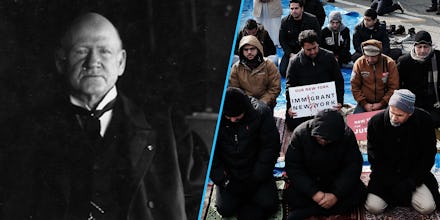Read Virginia's Muslim ban complaint that invokes stunning Plessy v. Ferguson dissent

It's a quote that's come up often in recent weeks:
"Those who do not learn history are doomed to repeat it."
Perhaps those words were top of mind Thursday when Virginia filed a complaint regarding President Donald Trump's recent executive order banning travel to the United States for refugees and travelers of seven majority-Muslim countries.
The complaint specifically called into question the constitutionality of section 3(c) of the order which suspends U.S. entry of nationals from the listed countries, arguing the section "violates the Due Process Clause of the Fifth Amendment as well as the Establishment Clause of the First Amendment."
"Absent preliminary injunctive relief, irreparable harm will continue to afflict numerous Virginia residents who hail from the seven majority-Muslim countries in question, and to whom the Federal Government ... after thorough vetting, has already granted lawful-permanent-resident ... status or valid student or work visas," the complaint states.
But it was the final section that stood out from the legalese and should serve as a warning to anyone fearful of reliving history's most egregious mistakes.
In the conclusion, Virginia calls upon the famous words of Supreme Court Justice John Marshall Harlan, written in 1896, the lone dissenter in the landmark "separate but equal" segregation case Plessy v. Ferguson.
The complaint draws stark comparisons between "the seeds of race hate" Harlan said Plessy was ensuring would be "planted under the sanction of the law" and the barely masked hatred contained within Trump's ban.
"Those seeds," reads the complaint, "must be rooted out, as soon as possible, lest they germinate and poison more Americans."
Read the complaint's conclusion in full below:
This is a monumental case involving a monumental abuse of executive power. So it is worth remembering another monumental case, Plessy v. Ferguson, that enshrined in American law — for more than a half century — the approval of government-mandated racial segregation. The majority in Plessy reasoned that government-mandated segregation “does not discriminate against either race, but prescribes a rule applicable alike to white and colored citizens.” We admire the first Justice Harlan for putting the lie to that claim: “Everyone knows” what was being justified, he said. The same is true here.And what Justice Harlan said next may be even more important for Twenty-First Century Americans to remember: “the seeds of race hate” should not be “planted under the sanction of law.”In this case, the seeds of hate towards Muslims are “planted under the sanction” of the executive order. Those seeds must be rooted out, as soon as possible, lest they germinate and poison more Americans. The executive order was conceived in bigotry and does not reflect who we are as a people.